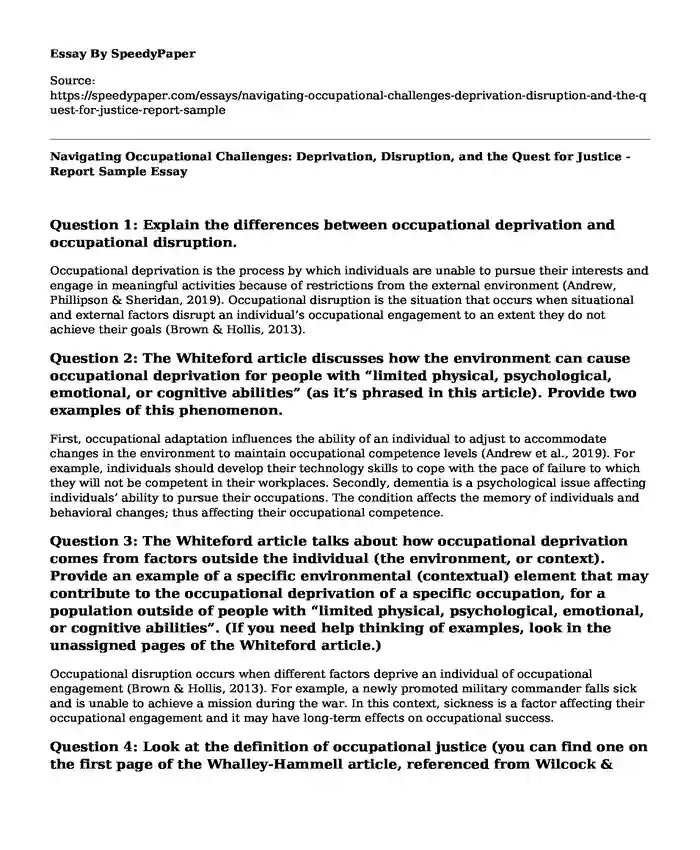
| Type of paper: | Essay |
| Categories: | Psychology Justice |
| Pages: | 3 |
| Wordcount: | 631 words |
Question 1: Explain the differences between occupational deprivation and occupational disruption.
Occupational deprivation is the process by which individuals are unable to pursue their interests and engage in meaningful activities because of restrictions from the external environment (Andrew, Phillipson & Sheridan, 2019). Occupational disruption is the situation that occurs when situational and external factors disrupt an individual’s occupational engagement to an extent they do not achieve their goals (Brown & Hollis, 2013).
Question 2: The Whiteford article discusses how the environment can cause occupational deprivation for people with “limited physical, psychological, emotional, or cognitive abilities” (as it’s phrased in this article). Provide two examples of this phenomenon.
First, occupational adaptation influences the ability of an individual to adjust to accommodate changes in the environment to maintain occupational competence levels (Andrew et al., 2019). For example, individuals should develop their technology skills to cope with the pace of failure to which they will not be competent in their workplaces. Secondly, dementia is a psychological issue affecting individuals’ ability to pursue their occupations. The condition affects the memory of individuals and behavioral changes; thus affecting their occupational competence.
Question 3: The Whiteford article talks about how occupational deprivation comes from factors outside the individual (the environment, or context). Provide an example of a specific environmental (contextual) element that may contribute to the occupational deprivation of a specific occupation, for a population outside of people with “limited physical, psychological, emotional, or cognitive abilities”. (If you need help thinking of examples, look in the unassigned pages of the Whiteford article.)
Occupational disruption occurs when different factors deprive an individual of occupational engagement (Brown & Hollis, 2013). For example, a newly promoted military commander falls sick and is unable to achieve a mission during the war. In this context, sickness is a factor affecting their occupational engagement and it may have long-term effects on occupational success.
Question 4: Look at the definition of occupational justice (you can find one on the first page of the Whalley-Hammell article, referenced from Wilcock & Townsend (2000). How do you think occupational deprivation prevents occupational justice? Provide a specific example of an occupation in your explanation.
Occupational deprivation affects occupational justice in the sense that the factors make individuals feel valued and not worth it. For example, many disabled young people in rural areas are unemployed because they feel hopeless (Aldrich, Boston & Daaleman, 2017). Disability bars individuals from achieving their dream occupations, such as preventing them from joining the military.
BONUS: The Whiteford article mentions that the internet provides a lot of opportunities to improve occupational justice. Provide one example of how the internet can provide an opportunity to improve access to a specific occupation (which would improve occupational justice). Then, provide one example of how reliance on the internet may limit access to a certain occupation (which would cause an occupational injustice).
The Internet promotes occupational justice by opening new opportunities for disabled marketers to exploit their talents (Aldrich et al., 2017). It is difficult for disabled individuals to freely move from one place to another in search of clients. However, with the internet, they can find clients online using platforms, such as social media. They will showcase their products and abilities to influence consumer buying behavior.
References
Aldrich, R. M., Boston, T. L., & Daaleman, C. E. (2017). Centennial Topics-Justice and U.S. occupational therapy practice: A relationship 100 years in the making. American Journal of Occupational Therapy, 71(1), 1-5.
Andrew, C., Phillipson, L., Sheridan, L. (2019). What is the impact of dementia on occupational competence, occupational participation, and occupational identity for people who experience the onset of symptoms while in paid employment? A scoping review. Australian Occupational Therapy Journal, 66, 130–144.
Brown, H. V., & Hollis, V. (2013). The meaning of occupation, occupational need, and occupational therapy in a military context. Phys Ther. 93, 1244–1253
Cite this page
Navigating Occupational Challenges: Deprivation, Disruption, and the Quest for Justice - Report Sample. (2024, Jan 05). Retrieved from https://speedypaper.com/essays/navigating-occupational-challenges-deprivation-disruption-and-the-quest-for-justice-report-sample
Request Removal
If you are the original author of this essay and no longer wish to have it published on the SpeedyPaper website, please click below to request its removal:
- Free Essay Example about the Cognitive Dissonance Concept
- Essay Example on the Importance of Affective Processes in the Digital Economy
- Mythical Portrait of the Colonized Described in Our Free Essay
- Free Essay Sample on the Personal Growth for the Counselor
- Crime in Jamaica. Paper Example
- Employee Engagement and Retention. Paper Example
- Essay Sample on Victims and Crime Evaluation
Popular categories




